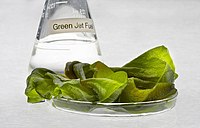
Biodegradation of naphthenic acids: identification of Rhodococcus opacus R7 genes as molecular markers for environmental monitoring and their application in slurry microcosms
Sign Up to like & getrecommendations! Published in 2020 at "Applied Microbiology and Biotechnology"
DOI: 10.1007/s00253-020-10378-5
Abstract: Nowadays, the increase of the unconventional oil deposit exploitation and the amount of oil sands process-affected waters (OSPW) in tailing ponds emerges the importance of developing bio-monitoring strategies for the restoration of these habitats. The… read more here.
Keywords: bio monitoring; rhodococcus opacus; naphthenic acids; gene ... See more keywords

Batch degradation of trichloroethylene using oleaginous Rhodococcus opacus in a two-phase partitioning bioreactor and kinetic study
Sign Up to like & getrecommendations! Published in 2020 at "Bioresource Technology Reports"
DOI: 10.1016/j.biteb.2020.100437
Abstract: Abstract In the present study, we present the biodegradation of trichloroethylene (TCE) for the first time using pure bacterial strain of Rhodococcus opacus PD630. TCE utilized as the sole carbon substrate by R. opacus in… read more here.
Keywords: degradation; phase; partitioning bioreactor; two phase ... See more keywords

Bioconversion of renewable feedstocks by Rhodococcus opacus.
Sign Up to like & getrecommendations! Published in 2019 at "Current opinion in biotechnology"
DOI: 10.1016/j.copbio.2019.08.013
Abstract: The production of fuels and chemicals from renewable feedstocks is necessary for a fossil fuel independent economy. Lignin and other industrial wastes represent sustainable, non-food feedstocks that can be tapped for microbe-based bioproduction. Rhodococcus opacus… read more here.
Keywords: renewable feedstocks; bioconversion renewable; feedstocks rhodococcus; rhodococcus opacus ... See more keywords

Simultaneous polycyclic aromatic hydrocarbon degradation and lipid accumulation by Rhodococcus opacus for potential biodiesel production
Sign Up to like & getrecommendations! Published in 2017 at "Journal of water process engineering"
DOI: 10.1016/j.jwpe.2017.02.009
Abstract: Abstract Biomass gasification effluent primarily contains polycyclic aromatic hydrocarbons (PAHs) generated during wet scrubbing of synthetic gas. These PAHs are toxic, mutagenic, carcinogenic and teratogenic, which, therefore, need to be removed prior to their release… read more here.
Keywords: potential biodiesel; biodiesel; lipid accumulation; rhodococcus opacus ... See more keywords

Transcriptomic analysis of Rhodococcus opacus R7 grown on polyethylene by RNA-seq
Sign Up to like & getrecommendations! Published in 2021 at "Scientific Reports"
DOI: 10.1038/s41598-021-00525-x
Abstract: Plastic waste management has become a global issue. Polyethylene (PE) is the most abundant synthetic plastic worldwide, and one of the most resistant to biodegradation. Indeed, few bacteria can degrade polyethylene. In this paper, the… read more here.
Keywords: analysis; transcriptomic analysis; rhodococcus opacus; rna seq ... See more keywords